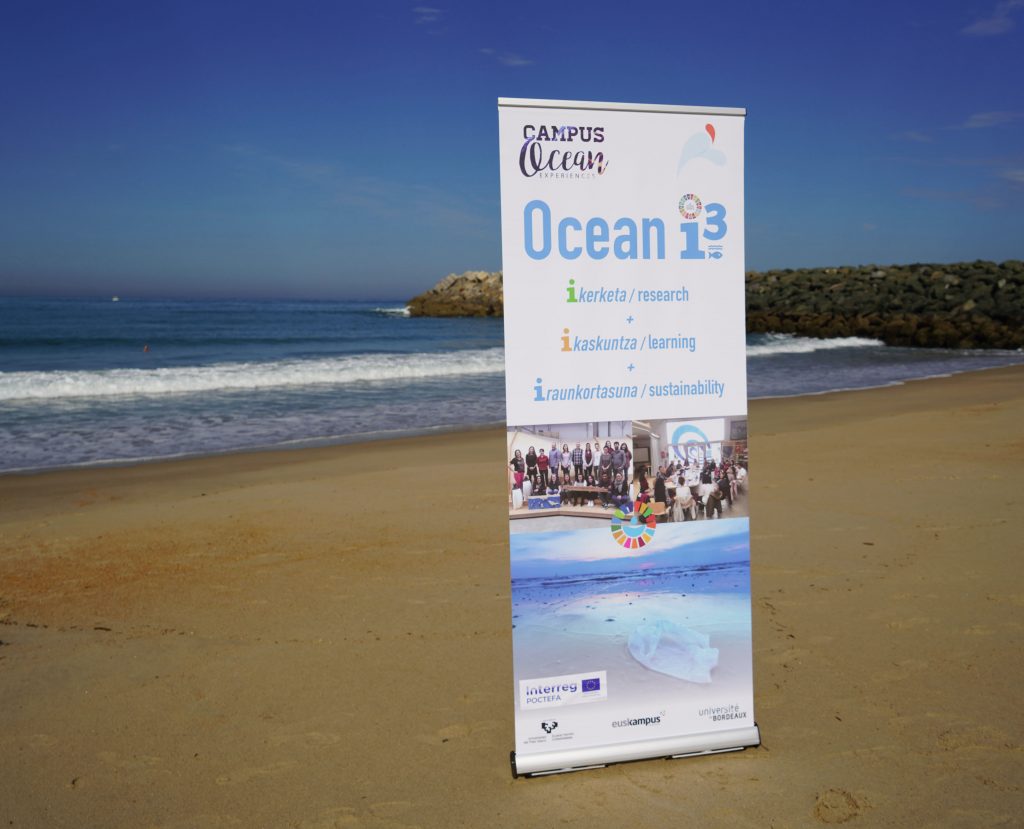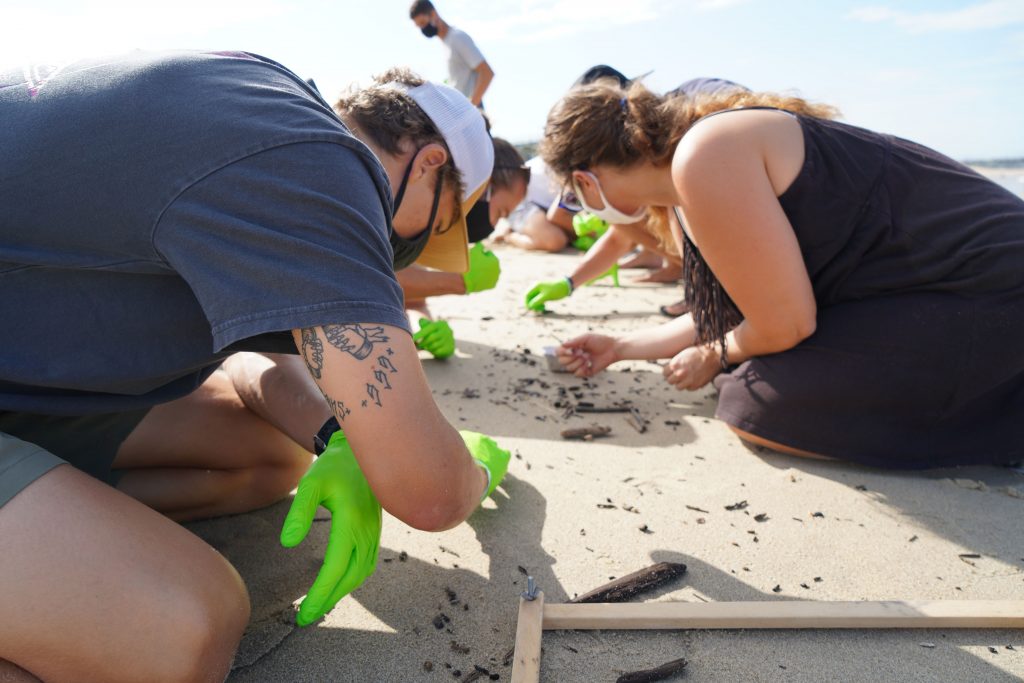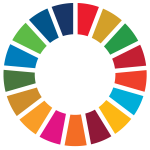Esta web utiliza cookies para que podamos ofrecerte la mejor experiencia de usuario posible. La información de las cookies se almacena en tu navegador y realiza funciones tales como reconocerte cuando vuelves a nuestra web o ayudar a nuestro equipo a comprender qué secciones de la web encuentras más interesantes y útiles.
Ocean i3; transdisciplinar and cross border research based learning collaboration for ocean’s sustainability
Description
Institution
University of the Basque Country

Organizations/areas of the university involved
Vice-Rectorate for Scientific and Social Development and Knowledge Transfer Vice-Rectorate of Undergraduate Studies and Educational Innovation
Country
Basque Country - Spain
Transdisciplinary, multilingual and intercultural educational innovation: students from two cross-border universities develop projects based on Mission-oriented Research and Innovation to contribute to the reduction of plastics on the Basque-Aquitanian coast.
Ocean i3 (Oi3) assumes the keys of the UPV / EHU’s own IKD i3 educational model, which combines Learning, Research and Sustainability, and integrates the values of the United Nations Agenda for Sustainable Development (2015) contained in the EHUagenda 2030, aligning the university’s work with the great challenges facing the planet and people.
The project involves both undergraduate and postgraduate students, and all disciplines of the two participating universities.
The main objective is to involve the university community together with territorial agents in highly complex Education for SDG experiences due to their interdisciplinarity, multilingualism (Spanish, French, Basque and English), interculturality and territorial and cross-border scope.
It mainly consists of an inter-university, multidisciplinary and multilingual intensive education and training itinerary (5 workshops) in which they develop transversal competences for sustainability by getting involved in challenges proposed by social agents of the Basque-Aquitaine international cross-border coastline.
The social agents propose real problems linked to plastic pollution of the ocean and coastline, which they identify in the form of a challenge. Students from the two universities form working teams for each challenge, and participate in a cycle of five synchronous cross-border workshops in which they collaboratively seek proposals and solutions to the challenges posed. It also works asynchronously using innovative digital platforms such as Oktonine, Gather and other virtual tools and applications (Mentimeter, Miro, Mural …) suitable for collaborative work and project development.
Active learning methodologies are used in order to: a) jointly define the scope of the challenge / problem, b) design achievable, concrete and measurable proposals in a collective and interdisciplinary way, and c) offer results (action plans, studies, prototypes, interventions, etc.) agreed with the territorial agents that have an impact on the challenges.
The whole community exercises fundamental competences to face the challenges of sustainability, such as: understanding and solving complex problems, creativity and global and integrative vision of the problems or communication in intercultural and multilingual contexts.
In the medium to long term, it also seeks to contribute to the co-construction of a Civic University committed to territorial issues and promoter of quality teaching and research at the service of the public good and in terms of sustainability.
Results and impact measured or expected
Throughout the three academic years, impacts are identified at 4 levels and jointly for the two universities:
Students. 100 students have participated; 25 internship contracts have been linked to the project with social entities located in the territory and 60 academic works have been developed (Final Degree Project, Master’s Thesis, subject work and PhD thesis) involving degrees and master’s degrees in 16 disciplines as a result of all of this.
Teaching staff. An inter-university-international teaching team has been set up for educational innovation with 33 teachers endorsed by the Educational Advisory Service of the University of the Basque Country (UPV / EHU).
Territorial. The collective construction of knowledge of the Oi3 community has been materialized in 11 challenges proposed by 13 different agents in the Basque-Aquitanian territory.
Institutional. A solid collaborative work between different teaching and institutional cultures that have designed, implemented and evaluated agreements and action procedures to improve the learning processes of university students in terms of Education for SDG.
Connection with the SDG framework
Ocean i3 is an educational innovation project that integrates distinctive elements necessary for Education for SDG:
- introduces transformative learning approaches for the university environment,
- develops competences, knowledge and promotes mindsets and mentalities that embrace complexity and rely on collaboration as the main keys to contribute to the challenges and transformations required for sustainable development and 21st century society,
- promotes interdisciplinarity and transdisciplinarity to understand problems in a transversal and integrated way, and promotes action-intervention research to produce relevant learning and align perspectives and capacities of all actors in the cross-border territory (university and non-university, public and private) ,
- its mission-oriented approach allows the integration of broad thematic agendas and the alignment of approaches and efforts to promote “” capacity to act “” at territorial level. In our case, Regions that can have an impact on environmental decision-making.
Barriers and follow up
More than barriers, the project faces many levels of complexity, which are also the added value it can show as a richness compared to other experiences: inter and transdisciplinary work, interculturality, multilingualism, and coexistence of different institutional cultures and socio-political contexts (different regions and states).
Transformations in the field of education require profound cultural changes in its own community and Oi3 goes beyond this by proposing, on its scale, an area of transformation of relations with territorial actors by co-creating spaces for genuine collaboration on both levels; the epistemological and interventional.
In order to overcome complexity, the training process promoted by Oi3 is based on the commitment of institutions aware of being living organizations that reflect, learn from their practices and transform themselves to respond to the changes and demands of sustainability in the 21st century.
Transferability of the initiative
Launched in the 2018-2019 academic year, Oi3 is being developed within the framework of the Euskampus-Bordeaux Campus of International Excellence, a strategic alliance promoted by the University of the Basque Country-Spain (UPV / EHU) and the University of Bordeaux – France (UB) since 2011.
Since 2020, it has received competitive funding from the European Regional Development Fund (ERDF), through the Interreg VA Spain, France and Andorra Territorial Cooperation Program (POCTEFA 2014-2020).
Oi3 is consolidating an approach to develop learning and research communities for sustainability that is transferable and scalable to other thematic areas developed at the Euskampus-Bordeaux Campus (eg circular economy, renewable energies, etc.).
It is currently considered as an international good practice to nourish the framework of the European University Alliance ENLIGHT Erasmus + in which UPV / EHU and UB participate and whose main objective is: to promote equitable quality of Life, sustainability and Global engagement through Higher education Transformation .
Education 4 SDG funciona gracias a WordPress


